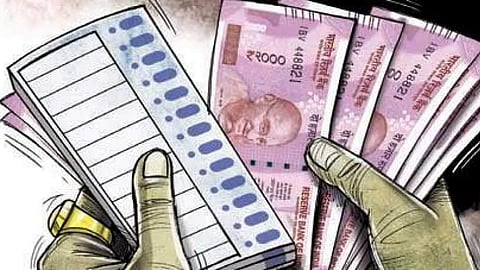

On Thursday, when the Election Commission of India (ECI) published the list of electoral bond buyers and the political parties that encashed these bonds, it occupied the press, but couldn't satisfy the public. That's because, despite an energetic stir in the pot, the meatier part was nowhere to be found, as none could confirm which corporate was burning billions in favour of which political party.
Data nerds and social media warriors were quick to dissect the bond-buying blitz, with overexcitement oozing out of every pore. Both the right and the left camps seemed so certain about the alleged quid pro quo deals between select corporates and political parties, though none could smell it or touch it. Still, their arguments and counterarguments reached such a feverish pitch that each saw their views alone were right and anyone who disagrees was the devil.
Helpfully, the Supreme Court, which brought the bond party to an end, has now directed the State Bank of India (the sole issuer) to furnish these very details.
As the scheme heads into a void, what remains elusive is a mechanism that allows clean election funding. In its current form, electoral bonds were loved by donors and recipients, but hated by everyone else on the other side. Though they are better than unaccountable cash donations, they didn't find acceptance due to non-transparency.
The government, perhaps, believes that donor anonymity is essential to prevent opposition scrutiny, given that we already have electoral trusts that ensure transparency. Here, companies make contributions to the trusts, which in turn donate to political parties. Like electoral bonds, these trusts enjoy tax exemptions, but unlike bonds, the donor details are publicly available. One reason critics insist that electoral bonds aren't quite a clean potato is the non-transparency, which allows a potential conflict of interest to remain hidden. So instead of cleaning out the rot, electoral bonds were creating as many problems as they were supposed to solve.
That brings us to anonymous donors, who prefer to purr quietly, but suddenly found themselves out in the open. In specific cases, the attention is so forensic that they can't simply dismiss the episode as a bad dream. For now though, they are maintaining an eerie silence. But if silence is the most powerful scream, we'll know its fallout in the next bout of election funding.
What's unmistakable though is that corporate donations to political parties are a routine affair, and existed much before electoral bonds came into the funding scene. Companies have been making political donations under the table to further their own interests and sadly, the practice seems to have continued even via electoral bonds, if preliminary details are anything to go by.
Consider the biggest donor Future Gaming and Hotel Services run by Santiago Martin, otherwise known as the lottery king, who went all in with a heavy purse buying Rs 1,368 crore worth bonds. What's questionable though is his personal and business credentials. Martin and his business entity were accused of defrauding the Sikkim government. He was arrested on land-grabbing charges during the Jayalalitha regime in Tamil Nadu, and the Enforcement Directorate, which began its money laundering probe in 2019, has attached and seized assets in excess of Rs 850 crore. What's even baffling is that this was a company with barely enough profits running in double digits, while its donations stood at a princely four-some figure.
Likewise, the little-known Hyderabad-based Megha Engineering and Infrastructure Ltd (MEIL) made a surprise entry as the second biggest buyer in the electoral bond land. Its promoter, the flamboyant P Pitchi Reddy, is one of the city's richest and has bagged multiple infrastructure projects spread across the country. But social media is abuzz with allegations against Reddy for pocketing public money while executing the Kaleshwaram Lift Irrigation Scheme. None other than the Comptroller and Auditor General (CAG) pulled up the company for receiving an excess payment of Rs 5,188 crore. MEIL, through its group companies, frequently bought bonds worth over Rs 900-odd crore over the past four years, during which time, it won several projects, which makes one suspect the possibility of a quid pro quo.
There are several other infrastructure and pharma companies including NCC Projects and Dr Reddy's Laboratories that purchased bonds. Curiously, some of these purchases were made just when the companies were either under regulatory heat or investigators' ire. One may call it an uncanny coincidence, but a closer scrutiny will certainly drop your jaw on the floor.
In all, political parties together encashed bonds worth Rs 12,769 crore in the last five years. The BJP received nearly Rs 6,060.52 crore, followed by the Trinamool Congress (TMC), which got Rs 1,609.5 crore, confirming the age-old fact that money often goes into a single pot that's in power.